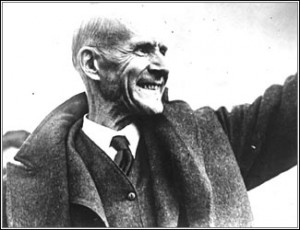Today we pay tribute to Eugene Victor Debs – the most prominent proponent of socialism ever to emerge from the United States. A candidate for president five times under the banner of the Socialist Party of America, under Debs’s leadership socialism became, for a time, a viable national political movement. Renowned and admired for his compassion, generosity, sensitivity and strong convictions even amongst opponents of his radical ideas, as we recall this great man, there must also be a sense of lament for what he might have achieved as a world leader.
Propelled into a lifetime of socialism by the Depression of 1893, Debs organised the first industrial union – the American Railway Union – and went on to lead its members during the infamous Pullman strike, described in the New York Times as “a struggle between the greatest and most important labor organization and the entire railroad capital”. He then became a founding member of the Industrial Workers of the World, but his primary devotion was to his beloved Socialist Party and his dream of a benevolent, classless society. Debs became the Great Voice of the Underdogs through his considerable oratory gifts – thousands would turn out to hear him wherever he spoke – but his most famous-ever public moment was his notorious anti-World War I speech delivered at the Ohio State Convention of the Socialist Party on 16th June 1918, which led to his arrest for violating the Espionage Act and crimes of sedition. He defended himself at the subsequent trial, refusing to call any witnesses. Moments before he was sentenced to ten years imprisonment, he spoke these famous words:
Your Honor, years ago I recognized my kinship with all living beings, and I made up my mind that I was not one bit better than the meanest on earth. I said then, and I say now, that while there is a lower class, I am in it. While there is a criminal element, I am of it. While there is a soul in prison, I am not free.
Debs served thirty-two months (during which time he still managed to run for president – his fifth candidacy – polling nearly a million votes) before President Warren Harding commuted his sentence and pardoned him on Christmas Day 1921. Howard Zinn tells the following story, which serves as a wonderful and accurate testament to Debs’ character and popularity: “On the day of his release, the warden ignored prison regulations and opened every cellblock to allow more than 2,000 inmates to gather in front of the main jail building to say goodbye to Eugene Debs. As he started down the walkway from the prison, a roar went up and he turned, tears streaming down his face, and stretched out his arms to the other prisoners.”
In a life of many great acts, this was to be Debs’ last – neither he nor the Socialist Party would recover from America’s first Red Scare in the years following the Great War. And as capitalism flexed its powerful muscle, the great socialist experiment was consigned to an embarrassing memory in American history. Debs died five years after his release from prison.
But as the bitter fallout from unchecked capitalism continues to unravel, now might be a prudent time to recall these prescient words written by Eugene Victor Debs:
“The issue is Socialism versus Capitalism. I am for Socialism because I am for humanity. We have been cursed with the reign of gold long enough. Money constitutes no proper basis of civilization. The time has come to regenerate society – we are on the eve of universal change.”



5 Responses to 20th October 1926 – the Death of Eugene V. Debs